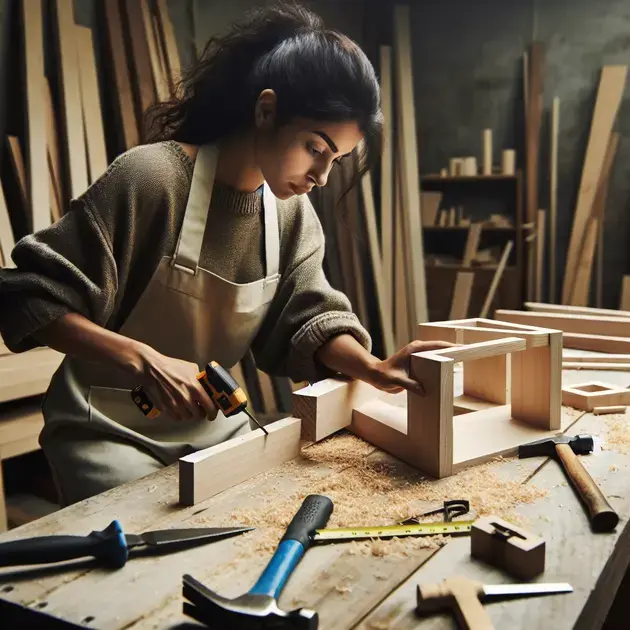Are you ready to master the art of woodworking and craft beautiful creations? Look no further – this ultimate guide is here to help you unlock your full potential in the world of woodworking.
Woodworking has been a beloved craft for centuries, but today, with the rise of digital technologies and online tutorials, it has never been easier to learn and perfect your skills. Whether you’re a beginner or a seasoned woodworker, this guide will provide you with valuable tips, techniques, and inspiration to take your craft to the next level.

Unlock Your Woodworking Potential
Whether you are a beginner or a seasoned woodworker, unlocking your woodworking potential is essential to improving your skills and creating beautiful projects. One valuable tip is to invest in quality tools that will make your work easier and more precise. Websites like Woodcraft (www.woodcraft.com) offer a wide range of woodworking tools, from basic saws and hammers to advanced routers and planers.
Another technique to enhance your woodworking skills is to practice different joinery methods. YouTube channels like Woodworkers Guild of America provide detailed tutorials on how to master classic joinery techniques such as dovetail joints and mortise and tenon joints.
Additionally, seeking inspiration from woodworking magazines like Fine Woodworking (www.finewoodworking.com) can help you discover new project ideas and techniques. Subscribing to online woodworking communities like WoodNet Forums allows you to connect with fellow woodworkers and learn from their experiences.
Experimenting with different types of wood is also a great way to unlock your woodworking potential. Websites like Wood Database (www.wood-database.com) provide detailed information on various wood species, helping you choose the right material for your projects.
Lastly, attending woodworking workshops and classes can provide hands-on experience and guidance from experts in the field. Websites like The Woodworking Shows (www.thewoodworkingshows.com) offer information on upcoming events and workshops near you.
Valuable Tips and Techniques for Crafting
When it comes to crafting, having the right tools and materials can make a significant difference in the quality of your projects. One valuable tip is to organize your crafting space for efficiency and inspiration. Websites like Craftsy (www.craftsy.com) offer online courses on organizing your craft room and optimizing your workspace.
Exploring new crafting techniques can also elevate your skills and expand your creativity. Websites like Creativebug provide a wide range of online tutorials on various crafting techniques such as embroidery, quilting, and paper crafting.
Another valuable tip is to experiment with different textures and materials in your crafting projects. Platforms like Etsy (www.etsy.com) showcase a variety of unique crafting supplies and materials, allowing you to add a personal touch to your creations.
Seeking inspiration from nature and everyday life can also enhance your crafting skills. Websites like Pinterest offer endless ideas for DIY projects and crafting inspiration, helping you think outside the box and create one-of-a-kind pieces.
Joining crafting communities and attending craft fairs can provide valuable networking opportunities and feedback on your projects. Websites like Meetup (www.meetup.com) allow you to connect with local crafting groups and participate in crafting events and workshops.
Inspiration to Elevate Your Woodworking Skills
Finding inspiration to elevate your woodworking skills is essential for growth and creativity in your craft. One valuable source of inspiration is visiting woodworking exhibitions and galleries. Websites like Woodworking Network (www.woodworkingnetwork.com) provide information on upcoming woodworking events and exhibitions worldwide.
Exploring different woodworking styles and traditions from around the world can also inspire new techniques and designs in your projects. Platforms like Instagram showcase the work of talented woodworkers and craftsmen, offering a glimpse into diverse woodworking practices.
Collaborating with other woodworkers through online forums and social media can spark new ideas and collaborations. Websites like Lumberjocks (www.lumberjocks.com) provide a platform for woodworkers to share their projects, ask for advice, and connect with like-minded individuals.
Attending woodworking masterclasses and workshops led by renowned craftsmen can provide valuable insights and techniques to elevate your skills. Websites like Marc Adams School of Woodworking (www.marcadams.com) offer a range of in-person and online classes taught by expert woodworkers.
Lastly, taking time to appreciate the beauty of wood and its natural characteristics can inspire unique designs and craftsmanship. Websites like Architecture Art Designs (www.architectureartdesigns.com) feature stunning woodworking projects that highlight the beauty of wood in various forms.

Discover Essential Woodworking Tools for Beginners
Woodworking is a rewarding hobby that allows you to create beautiful and functional pieces of furniture and decor. If you’re just starting out as a beginner woodworker, it’s important to have the right tools to help you get the job done efficiently and effectively. Here are some essential woodworking tools that every beginner should have in their workshop:
1. Measuring Tools
Accurate measurements are crucial in woodworking to ensure that your pieces fit together properly. Invest in a tape measure, combination square, and a good quality ruler to help you measure and mark your wood accurately.
Additionally, a marking gauge and a marking knife can help you make precise marks on your wood for more accurate cuts and joinery.
2. Cutting Tools
A saw is essential for cutting wood to size. A handsaw is a versatile tool for straight cuts, while a jigsaw or circular saw can be used for more complex cuts. A coping saw or fret saw is handy for intricate cuts and curves.
For more precise cutting, consider investing in a chisel set for making clean and accurate cuts, as well as a utility knife for trimming and shaping wood.
3. Joinery Tools
To join wood pieces together, you’ll need tools such as a hammer, nails, screws, and a screwdriver. A cordless drill is also essential for drilling pilot holes and driving screws efficiently.
For more advanced joinery techniques, a hand plane and a wood router can help you create smooth and seamless joints.
4. Finishing Tools
After assembling your woodworking project, finishing tools are necessary to sand and finish the wood. A random orbital sander is great for smoothing out rough surfaces, while a paintbrush or sprayer can be used to apply finishes such as paint or varnish.
For a professional finish, consider investing in a wood stain to enhance the natural beauty of the wood.
Step-by-Step Instructions for Starting Your First Project
Starting your first woodworking project can be both exciting and intimidating. With the right guidance and step-by-step instructions, you can confidently embark on your woodworking journey. Here’s a beginner-friendly guide to help you start your first project:
1. Choose a Simple Project
For beginners, it’s best to start with a simple project such as a small shelf or a picture frame. This will allow you to practice basic woodworking techniques without feeling overwhelmed.
Make sure to have a detailed plan for your project, including measurements, materials, and a cut list to follow.
2. Gather Your Tools and Materials
Before starting your project, gather all the necessary tools and materials. Make sure your tools are sharp and in good working condition to ensure clean and precise cuts.
Double-check your measurements and cut the wood pieces according to your project plan.
3. Assemble Your Project
Once you have all the wood pieces cut to size, begin assembling your project. Use the appropriate joinery techniques such as gluing, nailing, or screwing the pieces together.
Take your time to ensure that each piece is aligned correctly before securing them in place.
4. Sand and Finish Your Project
After assembling your project, sand the wood surfaces to remove any rough edges or imperfections. Start with a coarse sandpaper and gradually move to finer grits for a smooth finish.
Apply a wood finish of your choice to protect the wood and enhance its natural beauty. Allow the finish to dry completely before displaying or using your finished project.
Building Confidence in Your Woodworking Skills
As a beginner woodworker, building confidence in your skills is essential to tackle more advanced projects and improve your craftsmanship. Here are some tips to help you boost your confidence in woodworking:
1. Practice Consistently
The more you practice woodworking, the more confident you will become in your abilities. Dedicate time regularly to work on small projects or practice new techniques to hone your skills.
Don’t be afraid to make mistakes, as they are valuable learning opportunities that can help you improve.
2. Seek Guidance and Advice
Don’t hesitate to reach out to experienced woodworkers for advice and guidance. Join a woodworking community or take a class to learn from others and gain valuable insights into different techniques and approaches.
Ask questions, share your work, and be open to feedback to continuously grow and learn in the craft.
3. Set Realistic Goals
Set achievable goals for yourself as you progress in your woodworking journey. Start with simple projects and gradually challenge yourself with more complex tasks as you gain confidence and skills.
Celebrate your achievements, no matter how small, and use them as motivation to keep pushing yourself to improve.
4. Experiment and Be Creative
Don’t be afraid to experiment with different woodworking techniques and designs. Embrace your creativity and try new approaches to see what works best for you.
Whether it’s exploring new joinery methods, using different finishes, or incorporating unique details in your projects, experimenting can help you discover your personal style and build confidence in your craftsmanship.
Conclusion
Woodworking is a fulfilling craft that offers the opportunity to create stunning pieces of furniture and decor. As a beginner, having the right woodworking tools is crucial for efficiency and precision. Essential tools like measuring tools, cutting tools, joinery tools, and finishing tools are indispensable for any woodworking project.
Starting Your First Project
Embarking on your first woodworking project can be both exhilarating and daunting. By following step-by-step instructions and choosing a simple project to begin with, you can lay a strong foundation for your woodworking journey. Gathering the necessary tools and materials, meticulously measuring and cutting the wood, assembling the project with care, and finishing it to perfection are key steps in creating a successful woodworking piece.
Building Confidence in Your Skills
Confidence is vital in advancing your woodworking skills. Consistent practice, seeking guidance from experienced woodworkers, setting realistic goals, and experimenting with various techniques and designs are paramount to boosting your confidence and expertise in woodworking. Embrace creativity, learn from mistakes, and celebrate achievements to progress on your woodworking journey.